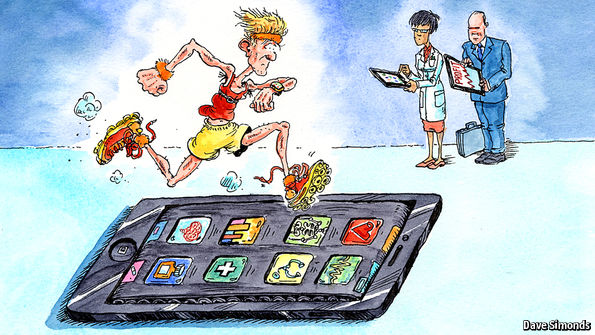Two More Thematic Tailwinds Are About to Change Healthcare
Healthcare expenditures are being driven by a combination of our Aging of the Population and Rise & Fall of the Middle Class investing themes, but there are two other Tematica themes that are poised to change the how, where, when and why people consume healthcare — Connected Society and Disruptive Technology. There is little argument that today’s healthcare is filled with wasteful spending and paperwork but given connective platforms such as smartphones and wearables, and disruptive technologies like apps, GPS, and sensors, healthcare is about to be turned on its head.
Last year Americans spent an amount equivalent to about 18% of GDP on health care. That is an extreme, but other countries face rising cost pressures from health spending as populations age.
In rich countries about one-fifth of spending on health care goes to waste, for example on wrong or unnecessary treatments. Eliminating a fraction of this sum is a huge opportunity.
Consumers seem readier to accept digital products than just a few years ago. The field includes mobile apps, telemedicine—health care provided using electronic communications—and predictive analytics (using statistical methods to sift data on outcomes for patients). Other areas are automated diagnoses and wearable sensors to measure things like blood pressure.If there is to be a health-care revolution, it will create winners and losers.
Andy Richards, an investor in digital health, argues that three groups are fighting a war for control of the “health-care value chain”.One group comprises “traditional innovators”—pharmaceutical firms, hospitals and medical-technology companies such as GE Healthcare, Siemens, Medtronic and Philips.
A second category is made up of “incumbent players”, which include health insurers, pharmacy-benefit managers (which buy drugs in bulk), and as single-payer health-care systems such as Britain’s NHS.
The third group are the technology “insurgents”, including Google, Apple, Amazon and a host of hungry entrepreneurs that are creating apps, predictive-diagnostics systems and new devices. These firms may well profit most handsomely from the shift to digital.The threat to the traditional innovators is that as medical records are digitised and new kinds of patient data arrive from genomic sequencing, sensors and even from social media, insurers and governments can get much better insight into which treatments work. These buyers are increasingly demanding “value-based” reimbursement—meaning that if a drug or device doesn’t function well, it will not be bought.
Overall, telemedicine is expected to grow rapidly. In America, GPs will conduct 5.4m video consultations a year by 2020, says IHS Markit, a research firm. Britain’s NHS is testing a medical AI from a London-based startup called Babylon which can field patients’ questions about their health. A paid service called Push Doctor offers an online appointment almost immediately for £20 ($24).
Source: The wonder drug: A digital revolution in health care is speeding up | The Economist




